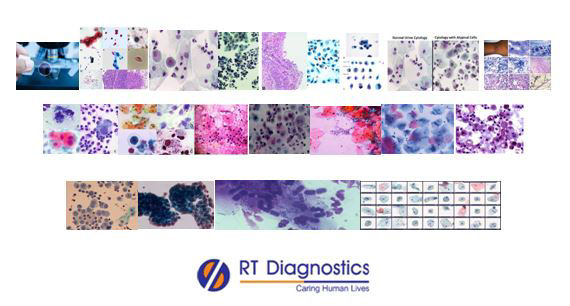Urine – Cytology:
Why Urine – Cytology Test?
CLINICAL INFORMATION
Microscopic cytological studies assist to investigate any morphological changes in the given sample specimen. Cytology is a test study of the cells, viewed under a microscope. Cytology is the examination of cells from the body, observed under a microscope for any suspected pathology. Cytological studies in patients’ samples help in screening for certain abnormal pathologies such as infections, inflammatory disease, UTI, precancerous conditions and/or cancers (malignancy) etc. Hematuria can be associated with certain abnormalities related to urogenital or genitourinary pathologies (associated with kidney, bladder, ureter etc). The urine cytology test is one of the many tools used to diagnose cancers in the urinary tract including bladder, kidney, prostate, ureter and urethral cancers etc. Thus occult blood (micro-hematuria) in urine specimens can be seen under a microscope for suspected pathologies. Urine Cytology Test looks for the presence of abnormal cells (like cancers) in the urine, such as urinary bladder cancer, urinary tract diseases and/or cancers and other cancers and other associated cancers involving the kidney, prostate (in males), ureter, urethra etc. The clinical manifestation includes hematuria, abdominal pain, lump in the lower abdomen, painful and/or painless urination etc. Therefore urine cytology test screens to detect the presence of abnormal cells in the given urine sample specimen of suspected patients eg. cases with urothelial carcinoma of the renal pelvis (renal cell carcinoma), ureter, bladder and its other associated pathologies. It is a non-invasive method for the diagnosis in the detection of cancers. These malignant cells are present with large and clear vacuolated cytoplasm and distinct nucleoli. This test is also helpful in differential diagnosis eg. inflammation or viral infections in the urinary tract, bladder pain syndrome (i.e interstitial cystitis) with clinical manifestations of bladder pressure, pelvic pain etc. A positive test result demands further additional tests such as CMV and another source of infection/pathologies behind abnormal findings other than malignancies. This test is especially useful in patients suspected of bladder carcinoma. The usual urine cytology test result includes a report stating results of the unsatisfactory specimen (request for repeat sample for the test), negative, atypical (some abnormal cells being spotted but not enough to be considered cancer), suspicious (abnormal cells suggesting the presence of cancer) and positive (cytology studies show satisfactory results, suggests for additional tests to confirm the presence of cancer eg. biopsy test for cytopathology i.ehisto-pathological studies). Thus a positive test result from further probes for supportive and evidence-based tests to confirm the basis of pathology. Other tests include diagnosis of urinary tract cancers, urinary bladder cancers, infections, inflammations etc. This test is indicated in patients with clinical manifestations of hematuria and its other associated signs and symptoms such as abdominal cramps etc. Warning signs of urinary bladder cancer include blood clots in urine, burning micturition, frequent urination, urge to urinate throughout the night – but unable to pass the urine, pain in the lower back etc. Signs and symptoms of cancer in the kidney include blood in urine, lower back pain, abdominal pain with cramps, weight loss, tiredness etc. Additional tests include nuclear matrix protein-22, bladder tumour antigen, fluorescence in situ hybridization (FISH) for abnormalities of chromosome 3, 7, 17 and 9p21, Immuno-cytology for carcino-embryogenic antigen, mucin glycoproteins etc. Other tests include CBC, ESR, CRP, D-dimer, Calprotectin test, immunochemical tests / Antigen tests, transferrin test for confirming anaemia, pap smear (in females), FNAC biopsy – Histopathology, imaging studies like SEM, TEM, cystoscopy, imaging studies such as CT Scan, spectroscopic studies etc.

General Instructions:
Sample Requirement: Specimen - Urine Sample. Test Preparation: None.
NOTE - Sample for specimen collections may vary based on the patient’s condition/cases according to the patient’s presenting complaints/signs or symptoms:
SPECIMEN REQUIREMENT (Special or Rare Cases) - As instructed and guided by Physician / Clinician / Pathologist / as per Laboratory’s requirements, according to procedures and protocols.
This Multi-Specialty Clinical Referral Laboratory RT DIAGNOSTICS provides precise and accurate tests with an extensive range of testing services to the medical centres to help in the diagnosis and identification of pathology in the test specimens for infectious diseases and also to evaluate the function of organ systems of the patient. It prevents further complications and helps to stabilize and restore health to near normalcy at the earliest without delay.



